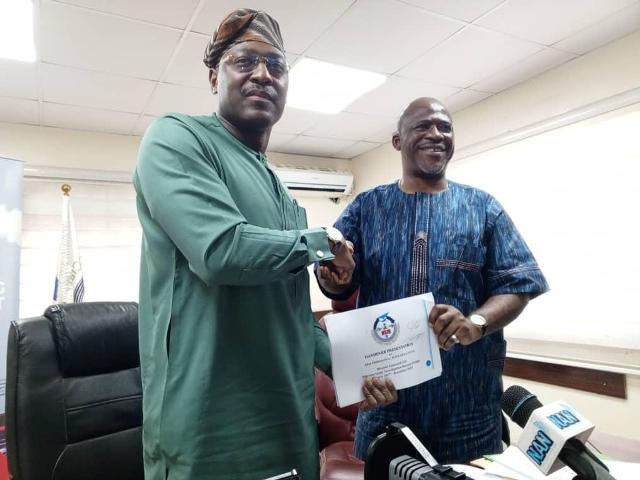The newly appointed director general and chief executive of the Nigerian Safety Investigation Bureau (NSIB), Mr Alex Badeh has taken over from his predecessor, Mr. Akin Olateru.
Speaking at the handover ceremony held in Abuja, Badeh praised Olateru whom he said “contributed enormously to improving transport safety in our nation.”
“Your service has laid the foundation upon which we can all build, and I pledge to carry the torch of safety to greater heights. I extend my sincere gratitude for your service and wish you all the best in your future endeavours,” he added.
He said as a “seasoned aviation professional” as well as a “concerned citizen” he will “dedicate every ounce of my being to ensuring that no journey ends in sorrow and no life is lost in vain.”
“I have seen the scars of tragedy, felt the sting of loss, and understand the ripple effect of a single accident. It is this understanding that fuels my passion, drives my resolve.
“I see a future where Nigerian skies are the safest in Africa; our trains glide seamlessly across the land, our waterways are traversed with confidence, and every journey, by any mode, is undertaken with the utmost assurance of safety,” he added.
Badeh also said his vision for the NSIB is to be an agency defined not by the tragedies we investigate, but by the transformative advancements in transport safety that we inspire.
“We will not simply react to accidents; we will proactively prevent them from occurring. We will harness the power of data, technology, and human ingenuity to build a future where every journey is undertaken with peace of mind, every mile traversed with the assurance of a safe return,” he stated.
Thereafter, he listed his four-point agenda as steadfast commitment to excellence, inter-agency and inter-sector collaboration, utmost transparency and accountability, and promotion of safety awareness, sensitisation and education
On commitment to service, he said: Our commitment to excellence will extend beyond compliance; it will also be devoted to driving transformative change for a safer tomorrow. Our goal is a multimodal transport system that is accident-free all year round. It is indeed an ambitious goal, but possible. To achieve this, we will leverage cutting-edge technology to revolutionise safety protocols, proactively identifying and addressing potential risks, while also offering intrepid recommendations to the relevant authorities.”
On inter-agency and inter-sector collaboration, Badeh said: “The NSIB team will work closely with the ministry of aviation and aerospace, as well as stakeholders across all government ministries, departments, and agencies, including airlines, maritime authorities, rail operators, road agencies, and most importantly, the Nigerian people.
“In aviation, we will collaborate with the airlines and regulatory bodies to strengthen safety management systems.
“We will work with maritime stakeholders to enhance safety measures across all operations, from passenger ferries to fishing vessels and cargo ships.
“We will engage the leadership of the railway corporation on implementing modern technology to significantly prevent incursion, collision, derailment and protect railway workers.
“We will also partner with the Federal Road Safety Corps to tackle the leading causes of road accidents such as speeding, distracted driving and alcohol impairment.
“Based on a comprehensive baseline analysis of transport safety that the NSIB will commission, we will develop specific collaborative efforts and launch targeted public awareness campaigns to make our transport network safer for everyone.”
Speaking on transparency and accountability, the NSIB chief said: “Transparency and accountability are cornerstones of our commitment to safety at the NSIB.
“Under my leadership, we will strive to uphold the highest standards and professionalism at every level. This includes keeping the public informed, engaging in meaningful dialogue, and holding ourselves accountable for our actions. This is how we earn and build trust.
“Furthermore, strict adherence to established standard operating policies, procedures, and protocols is mandatory for everyone involved. This obligation extends not only to NSIB staff but also to our valued partners in the transport sector.
“Any deviation from laid down standard operating procedures (SOP’S) or compromise on safety protocols, whether by NSIB staff or transport operators, will not be tolerated. Swift and severe punitive actions will follow any such infractions. Conversely, professional excellence will be recognised and rewarded.”
Om safety awareness, sensitisation and education, Badeh said: “From the youngest school children to the most seasoned travellers, we will raise awareness and sensitise the general public about the importance of safety in every aspect of our lives and how they can play their part in this collective responsibility.
“The complexities of our transport network, the human factors that can lead to error, and the ever-evolving technological landscape.
“But I also see the immense potential of this nation, the resilience of its people, and the unwavering spirit of innovation that burns brightly within us.”
However, he said the journey will not be a smooth sail
‘Accidents may occur and lives may tragically be lost. But in the face of any tragedy, I promise that the NSIB will stand firm. A promise to those who entrust their lives to the wings of planes, the rails of trains, the waves of ships, and the asphalt of roads. It is a promise that safety and zero-accident will always be our utmost priority, and in the face of unforeseen circumstances, every necessary measure will be taken to ensure the well-being of those involved, and learn from it, ensuring that every step forward is a step towards a safer future for all travellers.
However safety is not a solitary pursuit, it is a composition of collaboration. Under my watch, the NSIB will become a partner, educator, and advocate for transport safety. We will engage every stakeholder, from pilots in the cockpit to mechanics in the workshop, from policymakers in the Federal Capital Territory to passengers at the bus stations,” he said.
















































